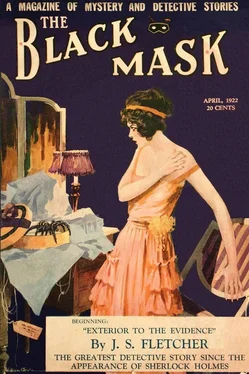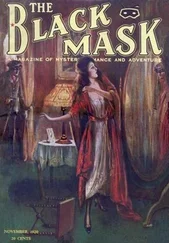J. Fletcher - The Black Mask Magazine (Vol. 5, No. 1 — April 1922)
Здесь есть возможность читать онлайн «J. Fletcher - The Black Mask Magazine (Vol. 5, No. 1 — April 1922)» весь текст электронной книги совершенно бесплатно (целиком полную версию без сокращений). В некоторых случаях можно слушать аудио, скачать через торрент в формате fb2 и присутствует краткое содержание. Город: New York, Год выпуска: 1922, Издательство: Pro-distributors Publishing Company, Жанр: Детектив, на английском языке. Описание произведения, (предисловие) а так же отзывы посетителей доступны на портале библиотеки ЛибКат.
- Название:The Black Mask Magazine (Vol. 5, No. 1 — April 1922)
- Автор:
- Издательство:Pro-distributors Publishing Company
- Жанр:
- Год:1922
- Город:New York
- ISBN:нет данных
- Рейтинг книги:3 / 5. Голосов: 1
-
Избранное:Добавить в избранное
- Отзывы:
-
Ваша оценка:
- 60
- 1
- 2
- 3
- 4
- 5
The Black Mask Magazine (Vol. 5, No. 1 — April 1922): краткое содержание, описание и аннотация
Предлагаем к чтению аннотацию, описание, краткое содержание или предисловие (зависит от того, что написал сам автор книги «The Black Mask Magazine (Vol. 5, No. 1 — April 1922)»). Если вы не нашли необходимую информацию о книге — напишите в комментариях, мы постараемся отыскать её.
The Black Mask Magazine (Vol. 5, No. 1 — April 1922) — читать онлайн бесплатно полную книгу (весь текст) целиком
Ниже представлен текст книги, разбитый по страницам. Система сохранения места последней прочитанной страницы, позволяет с удобством читать онлайн бесплатно книгу «The Black Mask Magazine (Vol. 5, No. 1 — April 1922)», без необходимости каждый раз заново искать на чём Вы остановились. Поставьте закладку, и сможете в любой момент перейти на страницу, на которой закончили чтение.
Интервал:
Закладка:
There were twelve servants who slept in the house, all occupying the upper floor, with the exception of Hitchens, Marie, Mrs. Fellows’ maid, and Swenson, the valet.
Watson, the butler and general man about the house, was the last person to bed and, according to his own statement, the first up in the morning. He had personally locked all the doors and windows on the first floor. They were all locked when he made his rounds in the morning.
Hitchens, in going to the drug store, had left the house by the side door. This he had left unlocked, relocking it upon his return. This led to the assumption on the part of some of the officials that the murderer had entered the place by that door during the secretary’s absence, hiding until his return, and after Fellows was asleep had struck the fatal blow and escaped by the same door, springing the lock after him.
There was no other way of looking at the matter unless one went on the theory that the deed had been committed by one of the servants or Mrs. Fellows. And the latter was unthinkable, while the servants, all of them had been in Fellows’ employ for years and were known to be absolutely loyal.
Of course the windows of the sleeping rooms on the second floor were open. A man of agility might have gained an entrance in this way. But luckily there had been a slight rainfall earlier in the evening and, as a result, the ground was in a condition to take impressions easily. The coroner and the sheriff made a thorough search for marks of a ladder or footprints, but were positive that there was none beneath any of the windows.
And there was always to be considered the lack of motive. Aside from the farmers who were jealous of the big landowner there was no one known to hold a grudge against him.
My friend Dwyer declined to assist the officials in their hunt for footprints, contenting himself with dawdling about the house as if greatly bored with the whole affair. Conversant as I am with his methods, I admit that this surprised me, for he is usually energy personified when there is some perplexing problem to be untangled. Eventually, however, the officials, nonplussed, were forced to turn to him for advice. He answered with a shrug of his shoulders, absolutely refusing to be drawn into a discussion of the case.
Following the time-worn methods, the sheriff called all of the servants together and examined them, eliciting no more information than had already been gained. It was at this point that Dwyer, who had listened to the questioning without comment, offered a suggestion:
“There’s a band of gypsies camped a few miles the other side of town,” he remarked quietly. “Their chief is old Father Lipki, a friend of mine. The old fellow knows his business from the ground up — fortune telling, mind reading and all of that sort of stuff. In fact, he’s assisted me on more than one occasion. I know that you’ll laugh at me for the suggestion, but let me bring him here. I’ll guarantee that he’ll have the murderer by the heels inside of half an hour. How he does it I don’t pretend to know. It’s positively uncanny, the way he pulls off his stunts. But if it’s results you want, then Lipki is your man.”
The sheriff sneered. Coroner Stevenson, in spite of his friendship for the detective, suppressed a smile with difficulty.
“You don’t want us to think that you believe in such rot, do you, Bram?” he inquired.
My friend shrugged his shoulders again.
“You asked for my opinion,” he answered. “I’m giving it to you. I’ll take a chance on Father Lipki. In fact, as I have stated, I have many a time. The man has powers beyond the understanding of men like us. But of course it’s up to you and the sheriff.”
III
Darkness had fallen when Dwyer and the coroner again drove up to the Fellows home accompanied by Father Lipki, the gypsy.
A typical member of his race was Lipki, a wrinkled little figure far past the age allotted to man. But in spite of his years he carried himself like a youth of twenty and his black, beady eyes glittered like those of a boy as he prepared the stage for the affair, his huge brass earrings rattling like castanets as he hurried here and there.
The spot selected by the coroner, upon the advice of Dwyer, for the test of Lipki’s powers was the huge living-room on the lower floor. The servants were ordered to carry out all of the furniture with the exception of the chairs, which were arranged along the wall. Then every member of the household with the exception of the widow was ordered to be present.
The old man, mumbling to himself, drew a large circle on the floor in the center of the room with a piece of charcoal, after which he commanded us to seat ourselves just outside the circular mark, warning us under penalty of death not to enter the circle unless commanded to do so by him.
His next act was to produce a brazier, which he lighted and placed in the center of the circle. By its side he placed a small vessel containing water.
The lights were then turned out. For an instant we were in darkness. Then the brazier flamed up, filling the room with an unearthly bluish-greenish sort of glare. Chanting to himself, the old man threw a pinch of powder into the flames at intervals; the light would turn for a second into a vivid red, then die away again to the dull, sickly bluish-green.
Suddenly he seated himself cross-legged at the side of the brazier and bowed his head. Closing his eyes as if in prayer, he mumbled to himself in an unintelligible jargon. I confess to a feeling of nervousness; I could tell from the expression on their faces that the others were the same.
The tension was becoming almost unbearable when the old man slowly raised himself to a standing position and, seizing the vessel of water, sprinkled it on the floor inside the circle, being extremely careful that not a single drop fell outside the mark.
“I must protect you from the powers of evil!” he explained.
Keeping carefully inside the mark, he made the rounds, touching each of us lightly on the forehead, making on each of us the sign of the cross.
“In the name of the Father, Son and Holy Ghost!” I heard him mumble to himself.
Reseating himself on the floor, he again bowed his head and once more his lips moved as if in prayer. Suddenly he fell over and for several minutes writhed about as if in terrific pain. I leaped to my feet to assist him, but the strong hand of Bram Dwyer held me back.
“Remember!” he shouted. “The old man commanded us, regardless of what happened, not to cross the line!”
After three or four minutes the spasms ceased and the gypsy seemingly none the worse for his experience arose and addressed us:
“My friends,” he commenced in his halting, broken English, “you have asked me here to use my arts in the detection of one who has committed a crime — the crime of murder. I have done my best. Inside this circle have I wrestled with the powers of darkness and the spirits of light. I know not which one of you committed this foul deed. No one knows save God.
“Yet He who created all things will not allow the crime of murder to pass unnoticed. Therefore I say unto you this:
“If he who committed this crime is in this room there will appear upon his forehead the sign of the cross — the mark that God placed upon Cain!
“This alone can I do More than that I am not allowed, for my powers are limited.”
He signaled for Dwyer to turn on the lights. An instant later we were blinking at the unaccustomed brightness. The old man seized the brazier and held it close to the face of each of us, gazing into our eyes as if seeking to read there the secret he was bent upon obtaining.
Then came a shriek! A gasp of astonishment — of horror! A cry! I turned my head, my eyes following the gaze of the others.
Читать дальшеИнтервал:
Закладка:
Похожие книги на «The Black Mask Magazine (Vol. 5, No. 1 — April 1922)»
Представляем Вашему вниманию похожие книги на «The Black Mask Magazine (Vol. 5, No. 1 — April 1922)» списком для выбора. Мы отобрали схожую по названию и смыслу литературу в надежде предоставить читателям больше вариантов отыскать новые, интересные, ещё непрочитанные произведения.
Обсуждение, отзывы о книге «The Black Mask Magazine (Vol. 5, No. 1 — April 1922)» и просто собственные мнения читателей. Оставьте ваши комментарии, напишите, что Вы думаете о произведении, его смысле или главных героях. Укажите что конкретно понравилось, а что нет, и почему Вы так считаете.












